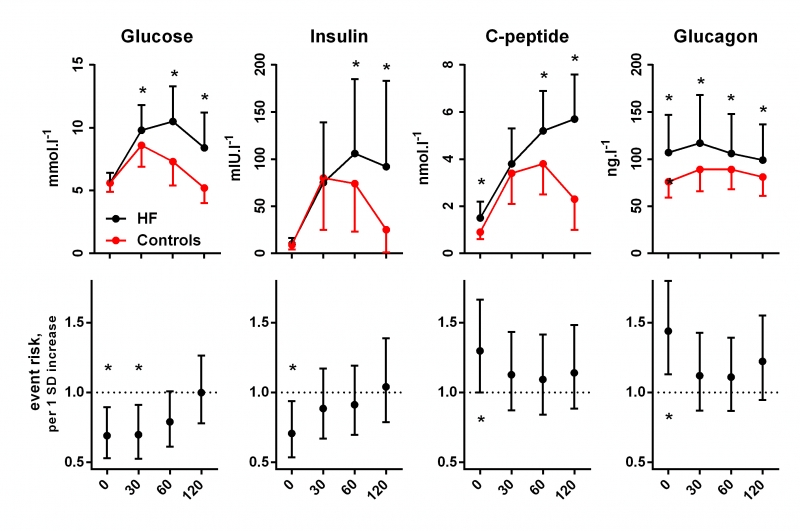GLUCOSE HOMEOSTASIS, PANCREATIC ENDOCRINE FUNCTION AND OUTCOMES IN ADVANCED HEART FAILURE
Background: The mechanism and relevance of impaired glucose homeostasis intrinsically caused by advanced HF are poorly understood. The goals of the study were to examine glucose regulation, pancreatic endocrine function and to identify metabolic factors relevant for prognosis in non-diabetic (DM) patients with advanced heart failure (HF).
Methods and Results: 140 advanced HF patients without known DM and 21 sex-, age- and body mass index-matched controls underwent body composition assessment, oral glucose tolerance test (OGT) with assessment of glucose-regulating hormones to model β-cell secretory response and were followed. Compared to controls, HF patients had similar fasting, but markedly increased post-OGT glucose and insulin. Pancreatic insulin secretion was not impaired, but with increasing HF severity, there was declining systemic insulin and insulin/C-peptide ratio, indicative of enhanced insulin clearance. This was correlated with lower cardiac output, liver impairment, right ventricular dysfunction and body wasting. After 449 days (IQR: 144-1500), 41% experienced adverse event (death, urgent transplant or assist device). Increased glucagon and, paradoxically, low fasting plasma glucose (FPG) displayed strongest relation to outcome (p=0.01). Patients in the lowest quartile (3.8-5.1 mmol.l-1, 68-101 mg.dl-1) had 3-times higher event risk than in the top quartile of FPG (6.0-7.9 mmol.l-1, 6.0-7.9 mg.dl-1) (RR 3.05, 1.46-6.77, p=0.002).
Conclusions: Low FPG and increased glucagon, but not hyperinsulinemia, were the strongest metabolic predictors of adverse events in advanced HF. Pancreatic insulin secretion was preserved and the decline of insulin with increasing HF severity arose from enhanced insulin clearance, associated with right heart failure, likely contributing to cardiac cachexia.


